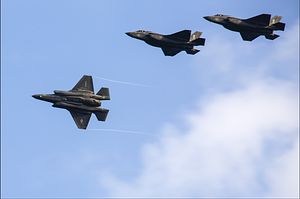Taiwan’s Minister of National Defense, Yen Teh-fa, has once more reiterated his country’s interest in procuring the F-35B, the U.S. Marine Corps’ short take-off and vertical landing (STOVL) variant of Lockheed Martin’s supersonic fifth-generation fighter jet.
In a recent interview with local media, the defense minister stated that the F-35B matches the Republic of China Air Force’s (ROCAF) requirement for a STOVL fighter aircraft.
“The air force’s operational requirements dictate that the next generation of fighters must possess stealth characteristics, be short take-off capable and be able to fight beyond visual range,” the minister said on May 14. “The F-35 is a fine fighter and we are seeking it.”
The Taiwanese government has not made an official request to purchase the F-35B from the United States so far.
“To answer the question as to whether we have formally requested the F-35 from the U.S., although we have been holding dialogues with U.S. officials, they have not reached a definitive conclusion,” according to the minister. “U.S. officials are evaluating it, and they might have their own concerns over its high cost or other considerations.”
The U.S. remains non-committal regarding the export of the F-35B to Taiwan. “In accordance with the TRA [Taiwan Relations Act], we will continue to make available to Taiwan defense articles and services necessary to enable Taiwan to maintain a sufficient self-defense capability,” American Institute in Taiwan, the de facto U.S. Embassy, spokeswoman Sonia Urbom told the Taipei Times in March. “We continue to review Taiwan’s defensive needs on an ongoing basis and will consult with Congress as required.”
As I reported in 2017, Taipei has been interested in procuring the fifth-generation fighter jet for a long time, but has been repeatedly spurned by both Democratic and Republican administrations:
Taiwan first expressed interest in the F-35B variant (…) in May 2002. Taiwan officials cited a need for up to 100 F-35B aircraft at the time. However, U.S. officials rebuffed the request along with earlier requests for upgraded F-16 fighter aircraft. (In 2011, U.S. President Barack Obama eventually agreed to upgrade the Republic of China Air Force’s fleet of around 140 F-16s.)
As I reported elsewhere, the F-35B might not be the best option for Taiwan when it comes to propping up its conventional deterrence posture vis-à-vis China given the country’s relatively modest defense expenditures (See: “Why Selling F-35s to Taiwan Is a Terrible Idea”):
(…) F-35s would be highly vulnerable to destruction on the ground by the People’s Liberation Army Air Force (PLAAF) or Chinese ballistic missiles before they could even take off, offsetting any advantage Taiwan would gain from procuring the fifth generation fighter jet. (…)
Even if some F-35s were to survive [an] initial [Chinese] onslaught, the aircraft would quickly be robbed of their necessary support infrastructure to continue operations. Consequently, should some F-35s manage to take off, it would likely be for a single sortie given the high probability that they would not have a functioning airbase to return to.
Instead, Taiwan would do well to invest its limited resources into acquiring new highly mobile medium- and long-range surface-to-air missile (SAM) defense systems.

































